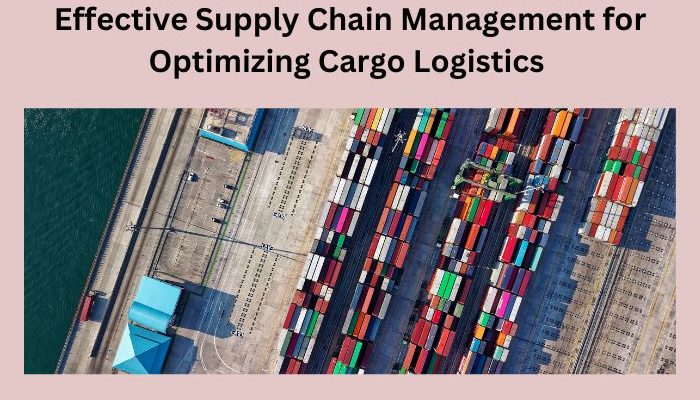Effective supply chain management plays a pivotal role in optimizing cargo logistics operations. With the increasing complexity and global nature of supply chains, businesses are realizing the importance of streamlining processes and enhancing efficiency.
This article explores the significance of supply chain management in cargo logistics and delves into strategies for optimization. From procurement to warehouse operations, transportation, and technology solutions, we will uncover key areas where improvements can be made. By implementing these strategies, businesses can achieve cost savings, enhance customer satisfaction, and gain a competitive edge in the dynamic world of cargo logistics.
Importance of supply chain management in cargo logistics
Supply chain management plays a vital role in cargo logistics by ensuring the smooth flow of goods from suppliers to customers. It brings together various stages of the logistics process and optimizes operations in multiple ways.
Firstly, it streamlines procurement processes, leading to cost-effective sourcing and improved inventory management. Secondly, it enhances warehouse operations by optimizing storage space and improving order fulfillment.
Additionally, supply chain management focuses on optimizing transportation routes and modes, reducing transit times and costs. Collaboration among stakeholders is another key aspect, fostering strong relationships and improving overall supply chain performance.
Effective supply chain management in cargo logistics leads to cost savings, improved productivity, enhanced customer satisfaction, and a competitive advantage in the industry. By prioritizing supply chain management, businesses can navigate complexities and achieve operational excellence. Not every business can manage their logistics processes. So, most businesses hire the cargo logistics services for efficient work.
Overview of Cargo Logistics Optimization
Cargo logistics optimization refers to the process of maximizing efficiency, reducing costs, and improving overall performance in the management and movement of goods. It involves strategic planning and implementation of various strategies to streamline processes, minimize delays, and enhance customer satisfaction.
Cargo logistics optimization encompasses areas such as procurement, warehousing, transportation, inventory management, and technology utilization. By implementing optimization techniques, businesses can achieve benefits such as reduced costs, improved operational efficiency, enhanced supply chain visibility, and increased competitiveness.
The goal is to create a seamless flow of goods throughout the logistics network, from the point of origin to the point of consumption, ensuring timely delivery, optimal resource utilization, and effective coordination among stakeholders.
Effective Supply Chain Management: How to Manage?
Streamlining Procurement Processes
Streamlining procurement processes is a crucial aspect of cargo logistics optimization. It involves establishing efficient supplier relationships, accurately forecasting demand, and strategically sourcing goods and materials. By optimizing procurement, businesses can reduce costs, ensure timely availability of resources, and enhance overall supply chain efficiency in cargo logistics operations.
Enhancing Warehouse Operations
Enhancing warehouse operations is essential for cargo logistics optimization. It includes optimizing storage space, implementing advanced inventory management systems, and utilizing automation technologies. By improving warehouse efficiency, businesses can minimize errors, maximize productivity, and ensure accurate order fulfillment, leading to streamlined logistics operations and improved customer satisfaction.
Efficient Transportation and Routing
Efficient transportation and routing are key components of cargo logistics optimization. It involves strategic planning and implementation of optimized routes, load consolidation, and real-time tracking technologies. By maximizing transportation efficiency, businesses can minimize transit times, reduce costs, and ensure timely and accurate delivery of goods, ultimately enhancing overall supply chain performance.
Leveraging Technology Solutions
Leveraging technology solutions is crucial for cargo logistics optimization. It involves adopting transportation management systems (TMS) and warehouse management systems (WMS) to enhance supply chain visibility, automate processes, and improve decision-making. By utilizing technology, businesses can achieve greater efficiency, accuracy, and transparency in their logistics operations, leading to improved overall performance.
Collaborative Approach and Supply Chain Integration
A collaborative approach and supply chain integration are vital for cargo logistics optimization. It entails building strong partnerships with suppliers, distributors, and other stakeholders, as well as integrating systems for seamless data exchange. By fostering collaboration and integration, businesses can improve communication, coordination, and efficiency throughout the supply chain, resulting in enhanced logistics performance and customer satisfaction.
Continuous Improvement and Performance Measurement
Continuous improvement and performance measurement are essential in cargo logistics optimization. It involves establishing key performance indicators (KPIs) and conducting regular performance audits. By continuously evaluating and improving processes, businesses can identify areas for enhancement, make data-driven decisions, and drive operational excellence in their supply chain management. This leads to improved efficiency, cost savings, and better overall performance in cargo logistics operations.
Conclusion
Effective supply chain management plays a pivotal role in optimizing cargo logistics operations. By streamlining procurement processes, enhancing warehouse operations, optimizing transportation and routing, leveraging technology solutions, adopting a collaborative approach, and implementing continuous improvement strategies, businesses can achieve significant benefits.
These include cost savings, improved efficiency, enhanced customer satisfaction, and a competitive edge in the dynamic world of cargo logistics. It is crucial for businesses to prioritize supply chain management and invest in strategies and technologies that optimize their logistics processes. By doing so, they can navigate complexities, adapt to market demands, and drive success in the ever-evolving field of cargo logistics.

















Comments